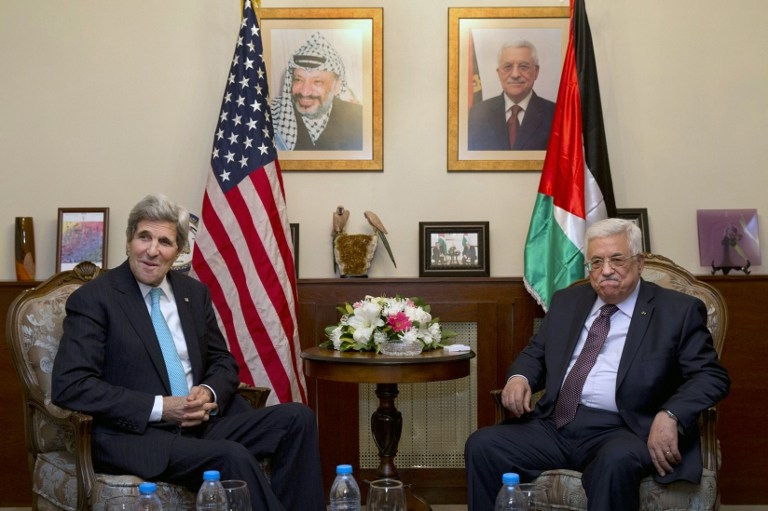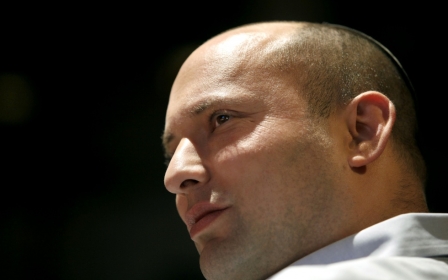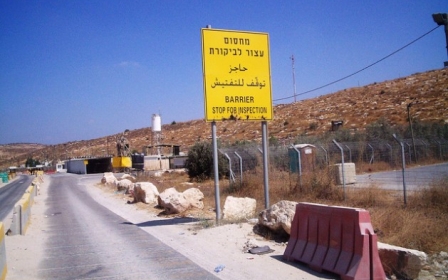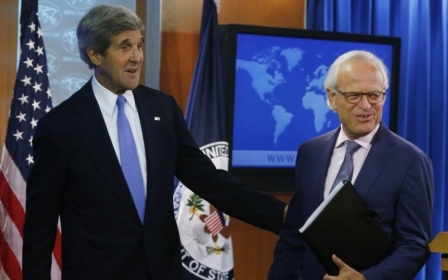Kerry, Abbas to discuss peace talks: Palestinians

US Secretary of State John Kerry will meet Palestinian president Mahmoud Abbas in London on Wednesday, a Palestinian official said, weeks after Middle East peace talks collapsed.
"The meeting will discuss a possible resumption of negotiations with Israel," the official told AFP, requesting anonymity.
But Kerry's spokeswoman denied there were any plans for the US top diplomat to hold talks with the Palestinian leader during a scheduled trip to London this week.
"There's no meeting planned," Jen Psaki told reporters, adding that Kerry would be in London on Thursday for discussions on the conflict in Syria.
Kerry's peace efforts derailed even ahead of their 29 April deadline, with Palestinian and Israeli leaders exchanging recriminations and reneging on commitments made during nine months of fruitless meetings.
New MEE newsletter: Jerusalem Dispatch
Sign up to get the latest insights and analysis on Israel-Palestine, alongside Turkey Unpacked and other MEE newsletters
"The meeting could be the last attempt by Kerry to revive negotiations," the Palestinian official said.
Reports of Wednesday's potential meeting follow US National Security Advisor Susan Rice's visit to the region last week in which she held separate talks with Abbas and Israeli Prime Minister Benjamin Netanyahu.
Abbas reportedly told Rice that he is willing to extend peace negotiations if Israel pledges to freeze settlement construction in occupied East Jerusalem and the West Bank for three months, releases the fourth batch of Palestinian prisoners as agreed earlier and tackles border issue first in future talks.
When the Israelis halted the peace talks in late April, following a reconciliation agreement between Fatah and Hamas, Netanyahu said Abbas had "made a pact with a murderous terror organisation" instead of choosing peace.
Should the peace talks resume, Kerry believes both sides must work on the future contours of a Palestinian state and security arrangements for Israel alongside other core issues such as refugees and Jerusalem.
Israeli security took precedence throughout much of the last talks, overshadowing the issues of future borders and refugees.
During the talks, Israel also announced thousands of new settler homes in the West Bank, on land the Palestinians want for a future state.
In late March, Israel backtracked on a pledge made at the start of the talks in July 2013 to release a final batch of veteran Palestinian prisoners, prompting Abbas to seek membership of several international treaties, breaking his own commitments.
The Palestine Liberation Organisation, which is dominated by Abbas's Fatah party, then signed an agreement with Islamist rivals Hamas on 23 April, after which an incensed Israel pulled out of the talks.
Middle East Eye delivers independent and unrivalled coverage and analysis of the Middle East, North Africa and beyond. To learn more about republishing this content and the associated fees, please fill out this form. More about MEE can be found here.




